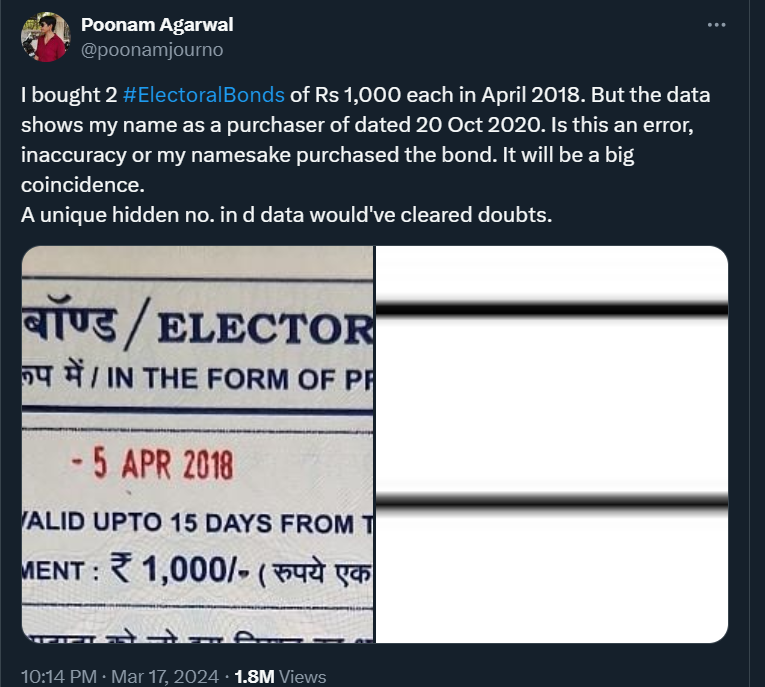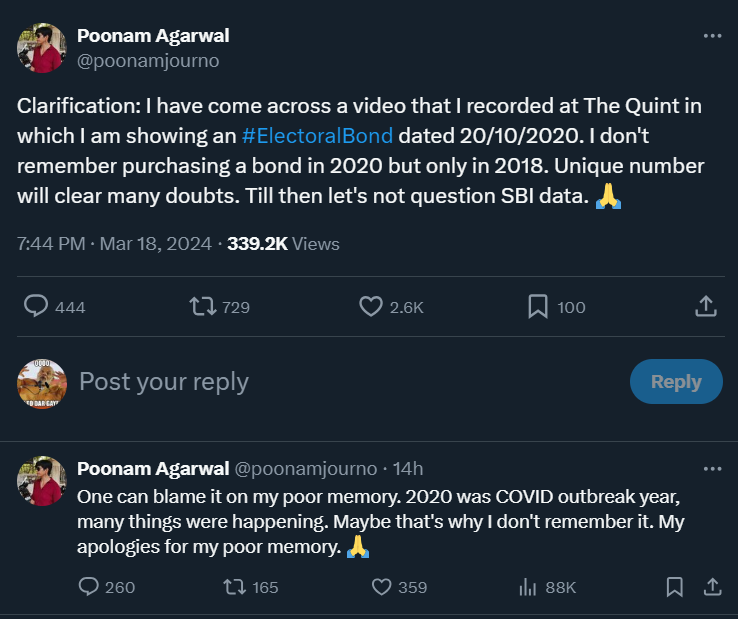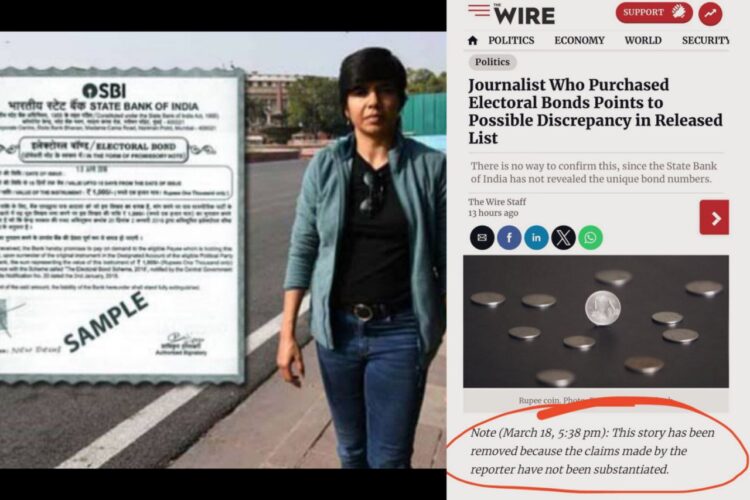Far-left media outlet The Wire faced yet another setback on Monday (March 18) as it retracted an article that cast doubt on the integrity of the electoral bonds list released by the State Bank of India (SBI), following claims by The Quint ‘journalist’ Poonam Agarwal.
The article, titled ‘Journalist Who Purchased Electoral Bonds Points To Possible Discrepancy In Released List,’ cited Agarwal’s assertions but was pulled down due to a lack of substantiated claims. “This story has been removed because the claims made by the reporter have not been substantiated,” read the article after it was pulled down. This incident marks another instance of embarrassment for The Wire, recalling previous retractions involving Tek Fog and Meta.
Agarwal’s tweet on March 17, 2024, alleged discrepancies in the SBI’s electoral bonds list, claiming her name appeared as a purchaser in October 2020 despite purchasing the bonds in April 2018. The article highlighted her concerns about potential errors or inaccuracies in the list.

In her articles and interviews, Poonam alleged that the State Bank of India (SBI) was disseminating misleading information regarding Electoral Bonds due to discrepancies in purchase dates. She asserted purchasing two Electoral Bonds worth Rs 1,000 each in April 2018, yet the data indicated her as a purchaser on October 20, 2020. She questioned whether this discrepancy was an error, an inaccuracy, or if someone with a similar name had made the purchase. Poonam advocated that a unique hidden number in the data could have resolved these uncertainties.
Left-leaning organisations, including The Wire, initially supported Agarwal’s claims, suggesting possible tampering with the electoral bonds list by the bank. However, a YouTube video surfaced wherein Agarwal herself explained her purchase of electoral bonds in 2020, contradicting her earlier statements.
Hours after The Wire retracted its story, Agarwal admitted via social media platform X that she had indeed purchased electoral bonds in 2020, attributing the confusion to her poor memory exacerbated by the COVID-19 pandemic. She urged against questioning the SBI’s data integrity until further clarification.

Notably, Agarwal’s investigative journalism on electoral bonds had garnered praise from several left-leaning ideologues, including Sushant Singh, Arfa Khanum Sherwani, and Ravish Kumar, who hailed her as a revolutionary figure. However, her claims regarding the discrepancy in the SBI’s electoral bonds list were debunked.
Despite the outlets propagating this misinformation, none offered clarifications for endorsing her claims. The Wire quietly retracted its story, citing the lack of substantiated claims by the journalist. It is pertinent to note that The Wire had previously published several false articles targeting the BJP, only to retract them silently upon discovery of their falsity.
She is @poonamjourno, Yesterday she claimed that SBI is sharing misleading information on Electoral Bonds as the purchase dates are not matching.
The tweet was quoted by many of her liberal friends, @thewire_in and many media houses did a story on it. The tweet had 1.5 million… pic.twitter.com/QnljyI7oi8
— Rohit (@Iam_Rohit_G) March 18, 2024
Furthermore, submissions made by the State Bank of India in the Supreme Court invalidated Agarwal’s insinuations about hidden alpha-numeric codes on electoral bonds, which she alleged could link donors with political parties. Agarwal, previously booked for abetment of suicide in an Army Jawan’s case in 2017, had asserted that electoral bonds were not entirely anonymous.
As Agarwal’s claims unravel, it underscores the importance of factual accuracy and thorough verification in media reporting, particularly concerning sensitive issues like electoral processes.
Representing the State Bank of India (SBI), senior advocate Harish Salve clarified that the bond numbers issued by the banks are exclusively available on the bond itself and not elsewhere. Additionally, SBI asserted that the hidden alphanumeric code serves as a security feature rather than for auditing purposes.
This revelation by SBI underscores two key points. Firstly, the presence of hidden numbers on the bond does not imply their use in linking donors with political parties. Secondly, SBI does not maintain records of the alphanumeric codes on the bonds, debunking the insinuations made by The Quint ‘journalist’ Poonam Agarwal in her report, which was lauded in leftist circles as “pathbreaking journalism.”
Agarwal attempted to portray her assumptions as facts by suggesting that the secret codes on electoral bonds could compromise donor anonymity and serve as a tool for government surveillance to track donations to political parties.
Another flawed argument put forth by Agarwal was that the watermark alone provided sufficient security, rendering the alphanumeric hidden code unnecessary. However, this analogy lacks merit, akin to suggesting that currency notes do not require serial numbers for security purposes as they already have watermarks.
While SBI confirmed its lack of documentation regarding the alphanumeric figures, potential scrutiny by the Supreme Court might prompt SBI to scan the bonds and release the numbers, potentially linking them to recipient political parties. However, connecting them to donors remains a remote possibility. Nevertheless, this revelation debunks the far-fetched assumptions made by Poonam Agarwal.
Certain political parties, such as the DMK and AIADMK, were able to disclose donor names, presumably because companies directly provided them with the bonds. However, for parties like the TMC and JDU, which claim that many donations were made anonymously, often through drop boxes, providing such data is impractical if the parties did not maintain records.




















Comments